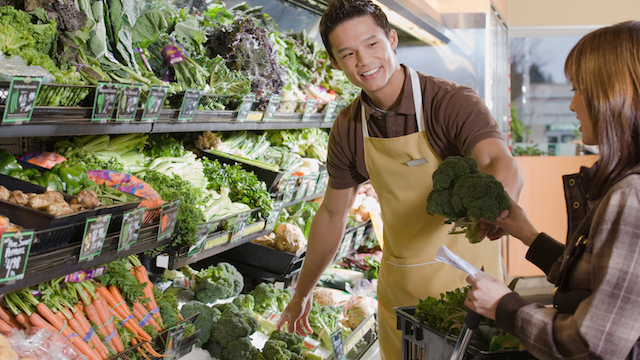“Lead or lose” – that is the message for food and grocery businesses from chief executive Joanne Denney-Finch of the industry’s research and training charity IGD.
Outlining her vision for the future of global retailing, she told delegates at the Canadian Grocer Thought Leadership Conference in Toronto that retailing was splitting into two parts: one largely automated and super-efficient, and the other based on delivering inspiration. “The blueprint is already emerging, not in one single place but spread across the world.”
Drawing on examples of best practice from global retailers and manufacturers, she told how greater automation of everyday, staple purchases would drive shoppers to seek out excitement and creativity for the balance of their grocery shopping.
“Eventually distribution centres will be run almost entirely by robots, and trucks will drive themselves,” she said. “Our smart appliances will use sensors to guarantee great cooking results, and people will hand over many decisions to their smart devices.
“We’ll sign up to long-term deals, because that will be easiest and deliver best value. So as shoppers, our key staple items will turn up just in time, whenever we need them.
“But on the other hand, as people’s lives keep growing more hectic, spontaneous buying and eating will also be even more popular. Online services will respond to this too, with meal kits and ready-to-eat food delivered to the door at rapid speed, but physical stores will always have the edge for instant gratification and for products we like to see before we buy.”
More exciting
Stores in convenient locations, such as train stations, would be favoured, so big stores would have to work harder to entice people. “They’ll become much more exciting, featuring lots of fresh food, new products, special events and more ways to taste, learn and discover. Experts will be on hand to give advice and deliver personal service.
Branded manufacturers will be helping their retail customers to differentiate and deliver excitement, because those that don’t will be marginalised.”
Retailers would also “compete fiercely” over health, said Denney-Finch, with the provenance of food and the ethics behind it being hugely important. “It will be an even more transparent world, and progressive companies will celebrate this. They’ll be really proud of the standards at every point of the chain for all the food they sell.”
She said shoppers would be delighted and companies tested, “but the best will really thrive”.
Denney-Finch said that having the right people with the right mix of skills would be needed to deliver this future of automation, from “highly capable food scientists, quality-control specialists and all-round good managers” to people who could bring new skills to both the in-store environment and supply chains.
“Our research shows that most British shoppers view the leading supermarkets as largely interchangeable and even as part of the establishment,” she said, “so food stores need to become edgier and more inspirational. Both retailers and suppliers will need to invest in creativity and product expertise, because we’ll need more people in store to advise and recommend.
“The more automated life becomes, the more essential it will be for companies to have a friendly face and to bring their brands to life.”
Denney-Finch said a rich range of skills would be needed “as skills will separate the winners from the losers”.






